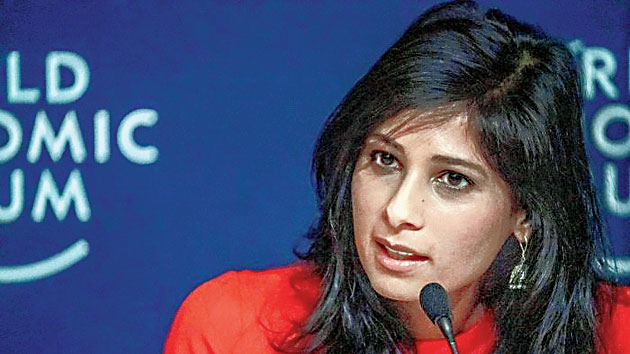International Monetary Fund chief economist Gita Gopinath will return to Harvard University in January as planned when her public service leave of absence from the university ends, the IMF said on Tuesday.
Gopinath, the IMF’s first female chief economist, joined the fund in October 2018 and led new IMF analytical research on the Covid-19 pandemic and vaccination targets as well as on climate change mitigation.
She was the John Zwaanstra Professor of International Studies and Economics at Harvard University when she joined the Washington-based global lender.
IMF managing director Kristalina Georgieva cited Gopinath’s “tremendous” impact on the IMF’s work.
“She made history as the first female Chief Economist of the Fund and we benefited immensely from her sharp intellect and deep knowledge of international finance and macroeconomics as we navigate through the worst economic crisis since the Great Depression.
“Gita also won the respect and admiration of colleagues in the research department, across the Fund, and throughout the membership for leading analytically rigorous work and policy-relevant projects with high impact and influence,” Georgieva said.
Gopinath won praise for drafting a $50 billion proposal on ending the pandemic by vaccinating at least 40 per cent of the population in all countries by the end of 2021, a plan later endorsed by the World Bank, the World Trade Organisation and the World Health Organisation.
Gopinath helped set up a climate change team inside the IMF to analyse, among other things, optimal climate mitigation policies.
Later, in a tweet, Gopinath thanked her colleagues for making her stint at the IMF truly gratifying.
Her departure from the global crisis lender is unrelated to the ethics scandal that had raised questions about Georgieva’s future as the IMF’s leader, according to a person familiar with the matter.
Gopinath’s leave from Harvard, already extended by one year, was ending, and her family had remained in Boston, the person said. She will remain at the IMF to oversee the release of the fund’s next World Economic Outlook forecasts in January.
The IMF executive board last week cleared Georgieva of any wrongdoing related to allegations that in 2017, as the World Bank’s chief executive, she put undue pressure on bank staff to alter data to favour China.
The US Treasury Department continues to press for changes at the institutions to safeguard their integrity.
Gopinath told a news conference last week that the IMF takes data integrity “incredibly seriously” and has robust systems in place but is always looking for ways to improve.











